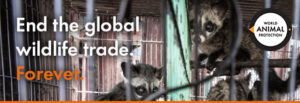For the second time in under 12 months, advertisements from World Animal Protection that call for a ban on captive dolphin breeding at Sea World have been torn down following pressure from Village Roadshow.
On Friday 13 November, the animal welfare charity unveiled the next phase of their campaign by calling on the likely new owners of Village Roadshow Limited – BGH Capital – to rule out the practice and ensure the current generation of dolphins at Sea World are the last to suffer a lifetime in lockdown.
A large 10×15 metre mural in Melbourne’s Lonsdale Street – close to BGH Capital’s offices – was painted with an image of a dolphin at Sea World to capture the attention of the private equity firm on the plight of captive dolphins at the theme park.
After only four days of display, Village Roadshow contacted the outdoor advertiser, threatening to withdraw future advertising spend if they did not remove World Animal Protection’s mural immediately.
World Animal Protection has requested to meet with BGH Capital to discuss the issue of captive breeding at Sea World, however were not successful and therefore pursued a public campaign.
Head of Campaigns at World Animal Protection, Ben Pearson said:
“It is concerning to see Village Roadshow preventing us from giving captive wild animals a voice.
“This is not the first time Sea World have tried to silence us. They’re trying to avoid a discussion about animal welfare by suppressing free speech.
“Thanks to our supporters this campaign will continue, so this can be the last generation of dolphins bred to suffer in captivity.”
In December 2019, World Animal Protection placed multiple billboards near Sea World in the Gold Coast to educate passers-by on the suffering of captive dolphins, and these were taken down within a matter of days.
At the time we couldn’t confirm why they were removed, however media reports indicated that JCDecaux was approached by Village Roadshow to complain about the billboards and they were subsequently taken down.
Major travel brands like TripAdvisor, Virgin Holidays, British Airways Holidays and Booking.com have already committed to stop selling tickets to dolphin shows and encounters.
As well as changes from the travel industry, earlier this year Canada passed a ban on keeping dolphins, whales and porpoises for entertainment, and in September France banned captive dolphin breeding.
The only other captive dolphin venue in Australia – Dolphin Marine Conservation Park in Coffs Harbour – has stopped breeding and is working with World Animal Protection and Action for Dolphins on a sea sanctuary for its dolphins.
Research* reveals 7 in 10 Australians prefer to see dolphins in the wild, and 6 in 10 are willing to pay an extra half more for this experience.
World Animal Protection is calling on the public to be a voice for dolphins and sign their pledge to only see dolphins in the wild on their website at www.worldanimalprotection.org.au/dolphinpledge.
















